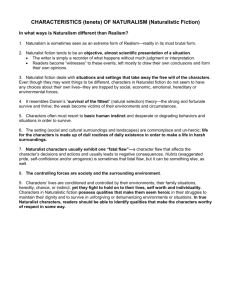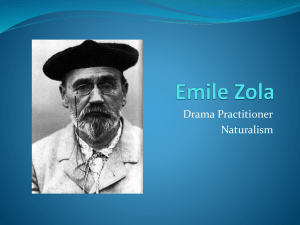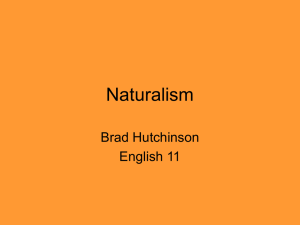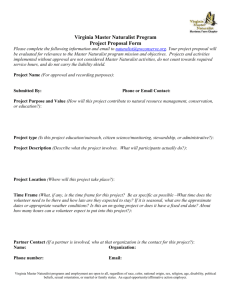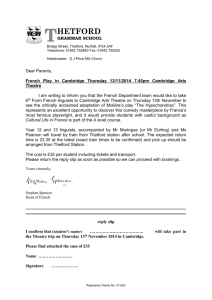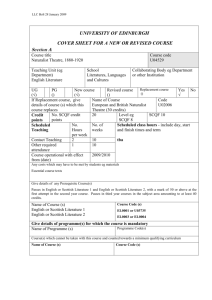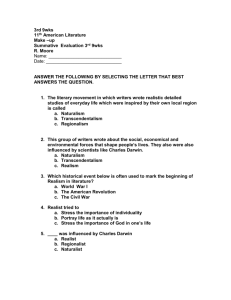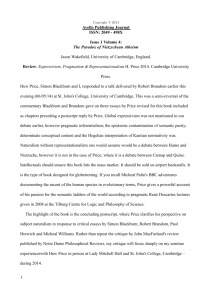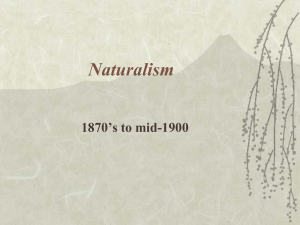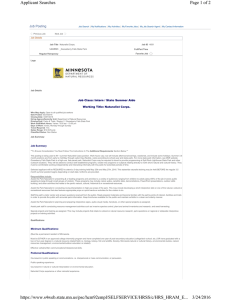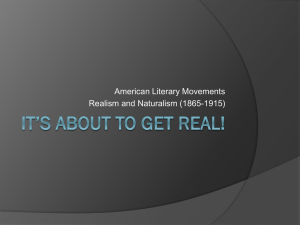section 1: module specifications
advertisement
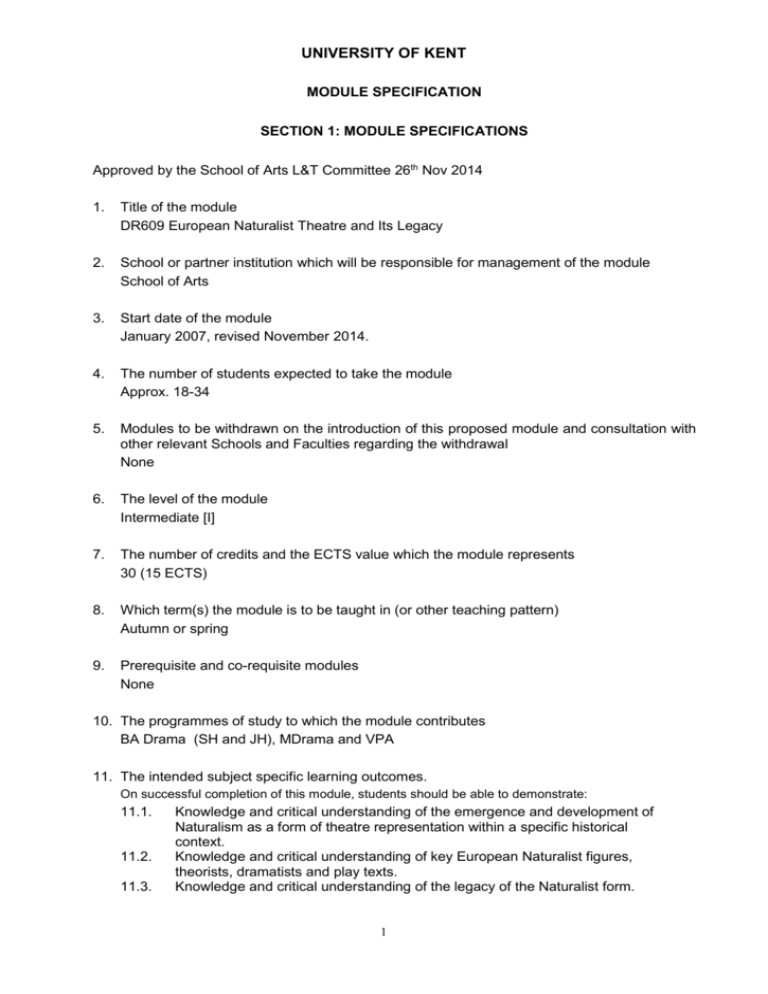
UNIVERSITY OF KENT MODULE SPECIFICATION SECTION 1: MODULE SPECIFICATIONS Approved by the School of Arts L&T Committee 26th Nov 2014 1. Title of the module DR609 European Naturalist Theatre and Its Legacy 2. School or partner institution which will be responsible for management of the module School of Arts 3. Start date of the module January 2007, revised November 2014. 4. The number of students expected to take the module Approx. 18-34 5. Modules to be withdrawn on the introduction of this proposed module and consultation with other relevant Schools and Faculties regarding the withdrawal None 6. The level of the module Intermediate [I] 7. The number of credits and the ECTS value which the module represents 30 (15 ECTS) 8. Which term(s) the module is to be taught in (or other teaching pattern) Autumn or spring 9. Prerequisite and co-requisite modules None 10. The programmes of study to which the module contributes BA Drama (SH and JH), MDrama and VPA 11. The intended subject specific learning outcomes. On successful completion of this module, students should be able to demonstrate: 11.1. 11.2. 11.3. Knowledge and critical understanding of the emergence and development of Naturalism as a form of theatre representation within a specific historical context. Knowledge and critical understanding of key European Naturalist figures, theorists, dramatists and play texts. Knowledge and critical understanding of the legacy of the Naturalist form. 1 UNIVERSITY OF KENT 11.4. 11.5. Skills of critical analysis, and the ability to interrogate dramatic and performance texts, debating the limits and possibilities of the Naturalist form of representation. Practical knowledge and understanding of Naturalist techniques. 12. The intended generic learning outcomes. On successful completion of this module, students should have: 12.1. 12.2. 12.3. 12.4. 12.5. 12.6. 12.7. Worked with others collaboratively, utilising a variety of team structures and working methods, developed an understanding of group dynamics and handling interpersonal issues. Developed and pursued creative projects within specified resource constraints of time, space and/or budget, thus developing organisational, time management and problem solving skills. Managed workloads to meet deadlines, and sustained focus for extended periods working on independent creative projects, developing autonomy and self-management. Used information retrieval skills, involving the ability to use information resources and technology, gathering and critically evaluating material. Applied critical and creative skills. Communicated effectively to a professional standard, coherent arguments and propositions in a variety of media, verbally and in writing, using appropriate communication and presentation technologies. Reflected on their own learning and development, identifying strategies for development exploring strengths and weaknesses and developing autonomy in learning and professional development. 13. A synopsis of the curriculum In this module students will explore the historical context in which Naturalism, as a literary and theatrical movement, developed. They will consider the varied practice of dramatists who sought to represent real life on stage in more accurate and convincing ways. The possibilities and limitations of this specialised mode of representation are investigated. Its legacy is then traced in a selection of subsequent dramatic texts that reflect a Naturalist approach or deal specifically with continuing arguments on life’s’ determining and shaping forces and their dramatic representation first contested in the 19th Century. 14. Indicative Reading List Benedetti, Jean (2008) Stanislavski: An Introduction, London: Methuen Drama. Chothia, Jean (1991) Andre Antoine, Cambridge & New York: Cambridge University Press. Furst, Lillian & Skrine, Peter (1971) Naturalism, London: Methuen. Innes, Christopher (ed.) (2000) A Sourcebook on Naturalist Theatre, London: Routledge. Miller, Anne (1931) The Independent Theatre in Europe from 1887 to the present, New York: B. Blom. Osborne, John (1971) The Naturalist Drama in Germany, Manchester: Manchester University Press. Pickering, Kenneth & Thompson, Jayne (2013) Naturalism in Theatre: Its Development and Legacy, Basingstoke: Palgrave MacMillan. 2 UNIVERSITY OF KENT Schumacher, Claude (ed) (1996) Naturalism and Symbolism in European Theatre 1850-1918, Cambridge & New York: Cambridge University Press Styan, J. L. (1981) Modern Drama in Theory and Practice. Vol. 1: Realism and Naturalism, Cambridge & New York: Cambridge University Press. 15. Learning and teaching methods, including the nature and number of contact hours and the total study hours which will be expected of students, and how these relate to achievement of the intended module learning outcomes: Lectures – weekly 1hr duration – Learning outcomes: 11.1-3 Combined Seminar/Practical exploratory workshops 2 & 3 hr duration twice weekly – Learning outcomes: 11.1-5 & 12.1,4,5,6,7 Independent learning comprising preparation, research, practical work – Learning outcomes 11.1-5 / 12.1-7 Supervision of practical project during workshop period– Learning outcomes: 11.1-5 & 12.1-7 Contact hours: 4-6 per week for 12 weeks Individual study time 228 hours Total hours: 300 16. Assessment methods and how these relate to testing achievement of the intended module learning outcomes 100% Coursework 40% Essay 3,500 words - Learning outcomes: 11.1,2,4,5 & 12.3,4,5,6, 40% Group Practical Project - Learning outcomes: 11.1-5 & 12.1-7 10% Supporting written documentation to accompany Project – Learning outcomes: 11.1-5 & 12.1-7 10% Process mark – workshop contribution and project development – Learning outcomes 11.1-5 & 12.1-7 17. Implications for learning resources, including staff, library, IT and space Suitable spaces for workshop/practical exploration. 18. The School recognises and has embedded the expectations of current disability equality legislation, and supports students with a declared disability or special educational need in its teaching. Within this module we will make reasonable adjustments wherever necessary, including additional or substitute materials, teaching modes or assessment methods for students who have declared and discussed their learning support needs. Arrangements for students with declared disabilities will be made on an individual basis, in consultation with the University’s disability/dyslexia support service, and specialist support will be provided where needed. 19. Campus(es) where module will be delivered: Canterbury 3
